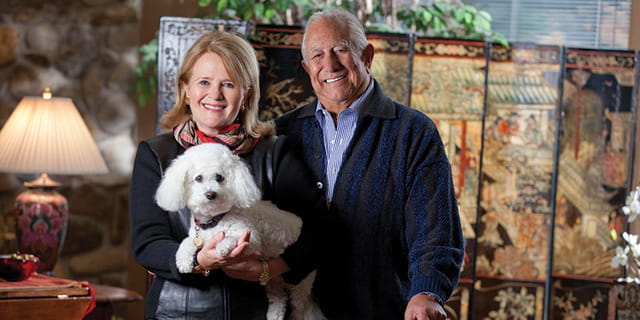Endowed Chair for UH Spine Institute Provides Backbone for Patient Care and Research

A gift from Mark and Christina Schumann has established the Mark P. and Christina M. Schumann Chair in Spinal Neurosurgery, aimed at advancing patient care, research and education related to spinal conditions. Gabriel A. Smith, MD, Co-Director, UH Spine Institute, Division Chief, Neurological Surgery, UH St. John Medical Center, is the first to hold this prestigious position.
Excellence in Spine Care
Pursuing spine care often means vulnerability, with patients taking action only after a bout of persistent discomfort in the neck or back. Conditions like degenerative disc disease, a tumor on the spine, a herniated disc or sciatica can sound ominous. Clambering unassisted through the landscape of healthcare only adds to the difficulty. Too often, patients do not know whether to see an orthopedic or a neurological expert for the best spine care in their situation.
Mark and Christina Schumann understand the importance of excellent spine care – and of caregivers being mindful about how patients move through their care journey. They have supported the UH Neurological Institute for more than fifteen years, having established a fund to support endocrinology and neurosurgery. Both are members of the UH Neurological Institute Leadership Council. In addition to supporting UH, the Schumanns have entrusted the health system with their care.
As patients, Mark and Christina saw opportunities for enhancing the referral process and for greater collaboration among specialists in neurology, neurosurgery and orthopedics. Their perspective was essential to moving forward the vision of the UH Spine Institute.
Launched in 2018, the institute is led by Co-Directors Zachary Gordon, MD, and Gabriel A. Smith, MD, who is also Division Chief of Neurological Surgery at UH St. John Medical Center, and now the Mark P. and Christina M. Schumann Chair in Spinal Neurosurgery.
“Dr. Smith and Dr. Gordon have assembled a collaborative team of caregivers,” said Mark. “They clearly understand the toll taken on those dealing with conditions of the spine and are making the road to recovery much smoother.”
Expanding Patients’ Options
With expertise in adult spinal disorders, Dr. Smith specializes in complex spinal reconstruction surgeries and decompression of the spinal cord and nerves. He leads the Complex Spine Surgery Fellowship at UH in the department of Neurological Surgery and is an Associate Professor at Case Western Reserve University School of Medicine. He is also an unaffiliated neurotrauma consultant for the NFL with a critical role in diagnosing and managing concussions.
Under Dr. Smith and Dr. Gordon’s leadership, the UH Spine Institute has created evidence-based care pathways to improve the patient journey from diagnosis to treatment. Before considering surgery, its specialists walk patients through non-surgical options such as physical therapy, pain management strategies, weight loss programs and counseling. When patients do need surgery, the team has developed an expanding menu of minimally invasive options.
The team includes spinal specialists from many disciplines, including neurology, neurosurgery, orthopedics, physical medicine, radiology, rheumatology and pain management.
“We know how important it is to make the care process seamless for our patients – to buoy their spirits, but also to deliver great outcomes,” said Dr. Smith. “Mark and Christina’s gift helps the UH Spine Institute conduct research, support our fellowship programs and continue our mission to provide a multidisciplinary approach to medical and spine surgical care.”
Advancing Patient Experience, Research and Education
Since inception, the UH Spine Institute has increased patient satisfaction, improved access and expanded surgical and medical spine services across the enterprise. “This chair is incredibly meaningful to us,” said Christina. “Having witnessed the transformation of spine care at UH from front row seats, we are proud to support the UH Spine Institute’s work to improve patient care and outcomes for more Northeast Ohioans.”


